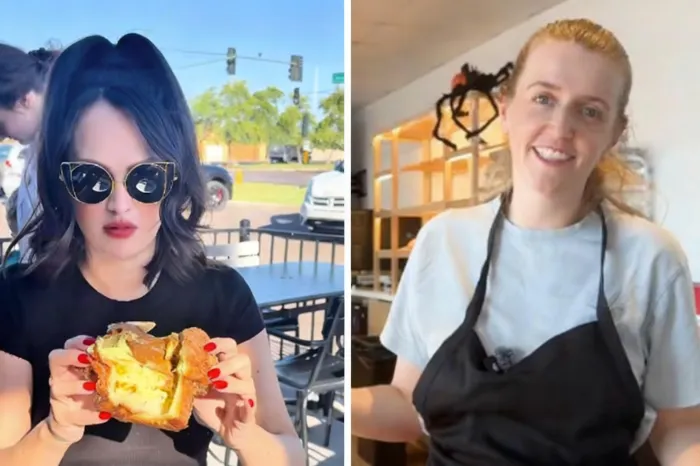### Introduction: Social Media’s New Shakespearean Stage
If there’s one thing Gen Z doesn’t sleep on, it’s influencer drama. Whether it’s kitchen catfights, existential content house rifts, or the great debate over who ordered the blandest matcha in Manhattan, the internet puts Broadway to shame. Influencers, once mere mortals with ring lights and an opinion, have risen to control algorithms—and, apparently, the fate of wine bars and pastry shops. So grab your popcorn, because today’s digital stage is burning hotter than a viral TikTok tutorial gone wrong.
### JL Patisserie vs. Glamorama: The Great Pastry Review Showdown
Let’s kick things off in Arizona, where the saga of “Pastrygate” split the internet like a poorly made cruffin. TikTok food influencer Glamorama (Aurora Griffo), never one to sugarcoat a review, visited JL Patisserie and served up takes sharper than a chef’s knife. The pistachio cruffin? “Fake.” Coffee? “Sour.” Quiche crust? “Overpriced.” The only pastry spared was the pumpkin pie croissant, perhaps because autumn aesthetic always gets a hall pass.
Bakery owner Jenna Leurquin, no stranger to dough or digital drama, responded with receipts—actual screenshots of DMs, not just croissant-crumb evidence. Leurquin said Glamorama had requested a paid collab and hinted she’d be “softer” in a sponsored post. The collab was declined, but soon cruel reviews followed. Was this honest criticism or a revenge soufflé? The internet’s jury was split between “honest influencer” and “petty pastrygate blackmailer.”
Things spiraled: Glamorama posted apologies, made her social accounts private, and reportedly dealt with threats. Meanwhile, JL Patisserie turned lemons into lemonade—or maybe sour coffee into viral fame. Customers lined up, sales spiked, and even TikTok food critic Keith Lee praised Leurquin’s dignified handling of the situation. In the wake of the drama, both sides seem to have called a truce, but Pastrygate proved one thing: a single influencer can turn brunch into a full-blown war zone.
### Micro-Influencers, Major Consequences: The Kis Cafe Catastrophe
From Arizona to San Francisco, influencer drama jumped coastlines when micro-influencer Karla (@itskarlabb) shared her bruising experience at Kis Cafe. Karla’s following didn’t reach Kardashian heights, but her viral takedown was enough to shutter the wine bar for good. After a co-owner publicly questioned her cred and claimed his daughter’s 600,000 TikTok fans trumped her own, Karla took to TikTok—her emotional recap drawing 21 million views and thousands of negative reviews for Kis Cafe.
The weird irony? Karla’s moment of micro-influence catapulted her upward: she’s now packing hundreds of thousands of loyal followers. The chef issued public apologies, the cafe closed, and brand consultants across the Bay surely added “Don’t diss the micro-influencers” to their PowerPoints. In today’s world, a single viral post from a self-made content queen can be more destructive than a health inspection fail.
### Content Houses: Where Positivity Meets Passive-Aggressive TikToks
Elsewhere, the Glow House—a teenage influencer collective—showed the world what happens when “living positive” collides with the primal urge for views. The premise: share good vibes, light up the world, gather millions of followers, and maybe drop a cryptic TikTok or two if someone steps out of line.
It started simple enough. Positivity, togetherness, and matching ring lights. But when Kendal (Kenny) Maynard left and a flurry of accusation-laced lives ensued, followers decoded subtle hints (Halloween costumes as clues? Sherlock Holmes could never) and took sides. Was the group a beacon of sincerity or a clique hungry for engagement? With influencers posting, deleting, and posting again—sometimes to “clear the air,” sometimes just to tease new merch—the real drama became unmasking intentions. The Glow House might claim authenticity, but the thirst for clicks guarantees the flame rarely stays positive.
### “Boring” NYC Influencers: The Existential Ennui of TikTok Stardom
Jumping to New York, the influencer scene was challenged from within, as creator Bridget (aka @MartiniFeeny) declared NYC influencers too bland to bother. According to her hot take, they’re carbon copies, endlessly cycling through matcha lattes, pilates sessions, and sponsored Iceland trips with all the excitement of recycling bins.
Her sassy critique set off a chain reaction—duets, parodies, and a solid round of influencer clapbacks, some silent, others performative. The saga sparked conversations about diversity in influencer economies and led the city’s content queens to defend their title as not just aesthetically pleasing, but also uniquely interesting. One viral video and suddenly, the definition of “influencer” itself was up for debate. Boring? Maybe. Unmissable drama? Absolutely.
### Lessons Learned: When Drama Drives Business—and Brand Disaster
Brands and businesses can learn from these influencer escapades. A flashy mansion party with cosmetic gurus may look fabulous on Instagram, but one petty altercation or viral diss, and it’s suddenly the center of a crisis PR huddle. The Pastrygate episode, Kis Cafe’s collapse, and the content house quarrels all show the delicate balance brands must tread: influencer partnerships can offer instant exposure and engagement, but a single spat can burn bridges faster than a trending meme.
Consumers, meanwhile, are hooked not just for product recommendations, but for the popcorn-worthy plot twists. In a space where the reach of a single micro-influencer can wreak more havoc than a triple espresso, authenticity is currency and a cryptic TikTok can rally millions like a viral call to arms.
### Conclusion: Influencer Drama—It’s Here to Stay
Influencer drama is modern entertainment. Sure, bread still rises, coffee still brews, and mansion parties still (sometimes) sparkle, but in the world of likes, shares, and callout culture, every post is an audition and every unfollow a plot twist. If Shakespeare wrote for TikTok, his tragedies might have come with apology statements and “collab declined” DMs. For now, at least, the internet keeps rolling—bitter reviews, emotional clapbacks, and the ever-present threat that your next croissant could be the subject of a viral feud.
Stay tuned. Tomorrow’s influencer drama is, undoubtedly, in pre-production.
—





























